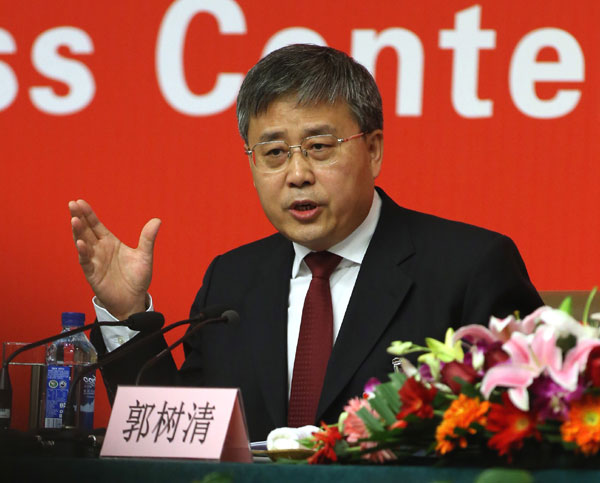
Chinese securities regulators have decided to shelve launching an "international board" for the mainland stock market but plan to expand the renminbi investment quota for foreign financial institutions and open more avenues for overseas investors.
"There is no plan to launch the international board in the short term," Guo Shuqing, chairman of the China Securities Regulatory Commission, said on Sunday at a news conference on the sidelines of the 18th National Congress of the Communist Party of China.
 |
|
Guo Shuqing, chairman of the China Securities Regulatory Commission, said the government is considering raising the quota that limits foreign financial institutions' renminbi investments. WU ZHIYI / CHINA DAILY |
As a result, foreign enterprises will have to wait longer to issue stocks in China's A-share market.
The CSRC chairman said this new financing platform for foreign investors is not likely to affect share prices in the mainland market.
As the rules about trading, accounting and supervision for the international board are very different and complicated, the top securities authorities prefer to take a cautious stance, he said.
"But we will further enlarge the quota for foreign investors to expand investment in the mainland as well as help to stabilize the share market," Guo said.
The CSRC, the People's Bank of China and the State Administration of Foreign Exchange have agreed to continue to expand the quota for qualified foreign institutional investors if the current amount of $80 billion does not satisfy investor demand, and to further ease the application standards for foreign institutions.
"We are looking at offering a preferential tax policy according to international practice for QFIIs," the CSRC chairman said.
The QFII program, launched in 2002, allows overseas brokerages, fund houses and trust firms to invest in Chinese capital markets.
In April, China increased the total QFII investment quota to $80 billion from the previous $30 billion.
Meanwhile, the regulator also plans to readjust the control on capital outflows "based on the changing situation" to limit market fluctuations.
"Foreign investors are keen to invest in the Chinese market, especially in A shares," said Gui Minjie, chairman of the Shanghai Stock Exchange. "So far, the annualized rate of return of QFIIs can be as high as 16 percent."
The CSRC has also "agreed in principle" to expand its renminbi QFII, or RQFII, pilot program by increasing its investment quota by 200 billion yuan ($31.74 billion), as the current 70 billion yuan quota falls short of overseas investors' demand, according to the chairman.
China launched the RQFII mechanism in December 2011 to provide financing channels for overseas yuan funds to invest in the mainland securities market. The quota was raised to 70 billion yuan from 20 billion yuan in April.
By the end of September, 157 foreign funds had invested $30.8 billion in QFII and 21 financial institutions had a total RQFII investment of 39 billion yuan, according to the State Administration of Foreign Exchange.
"I feel very confident about the Chinese securities market," said Guo on Sunday. "It is expected to bring more stable returns to investors."
The Chinese stock market has been in a gloomy period for more than four months since July, with its benchmark index lower than 2300. It dropped by 15 percent from a year earlier, along with the economic slowdown and the decrease in companies' profits.
Regulators should act against illegal trading and protect investors to aid its performance, Guo said.
In his report to the 18th National Congress of the CPC, President Hu Jintao vowed to accelerate the development of the capital market by promoting securities products and effectively channeling money into the real economy to help industrial structural upgrading.
"The improvement in the financial system can strongly support the growth pattern of transaction," Guo said, pointing out that now is the right time to expand economic reforms because growth is gradually getting back on track.
The CSRC said it has worked with the Ministry of Science and Technology to draft policies to evaluate scientific achievements from capital investment.
The commission also wants to encourage science and technology workers to share in the profits from their achievements. Laws and regulations should be made to protect their right to buy shares in their own companies, the CSRC said.







